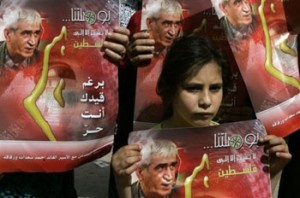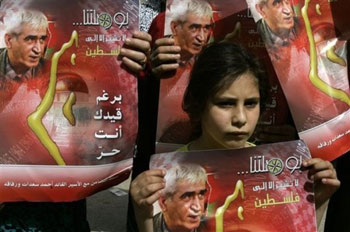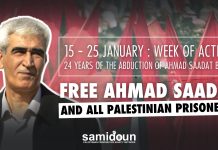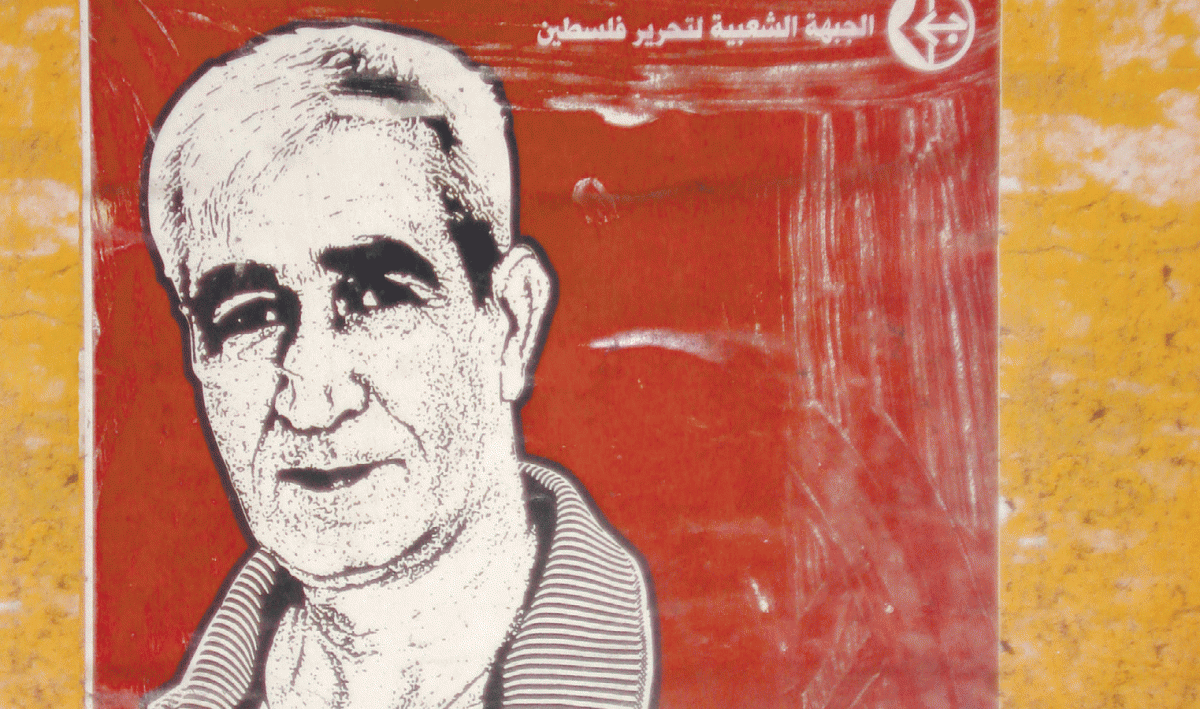Protests, actions and symposia continued to take place throughout Palestine and Lebanon in solidarity with Ahmad Sa’adat, including the below events in Saida and Sour, Lebanon, and in Rafah, Gaza and Nablus in the West Bank.
Saida, Lebanon
 A meeting and demonstration in support of Ahmad Sa’adat took place in Saida, Lebanon on June 19, 2009, paying tribute to his role as a symbol of steadfastness.
A meeting and demonstration in support of Ahmad Sa’adat took place in Saida, Lebanon on June 19, 2009, paying tribute to his role as a symbol of steadfastness.
Representatives of Palestinian forces and political parties, popular committees and trade union, youth, women’s and students associations participated in the event. The attendees marked a moment of silence in solidarity with Sa’adat and all the martyrs and prisoners.
Dhafer Al-Khatib, member of the Central Committee of the PFLP, spoke at the event, as did the secretary of Fateh movement in Saida, Dr. Kassim Sabah, as did Abu Nizar of the Palestinian Front and Kawash of the DFLP.
Sour, Lebanon
The Popular Committees representing the Palestinian camps and institutions in Sour gathered at the headquarters of the International Committee of the Red Cross in Sour on June 18, 2009, where they met with the ICRC and delivered a letter addressed to the presidency of the ICRC in Geneva.
The delegation called upon the ICRC, which is responsible for monitoring conditions and providing a mechanism for communication to prisoners around the world, and all humanitarian and human rights bodies, international organizations and relevant UN bodies to intervene immediately to stop the persecution of Ahmad Sa’adat in the zionist jails, and to protect the rights of thousands of Palestinian prisoners lacking the most basic standards of life.
The letter also called upon these institutions to work to stop the practices against Sa’adat who was kidnapped contrary to all international law and norms, and warned of the dangers to Sa’adat’s life and health, urging that it is critical to act to secure his freedom immediately.
Rafah, Gaza
A mass rally took place on June 18, 2009 in Rafah Governorate, in solidarity with Ahmad Sa’adat.
The participants carried Palestinian flags and posters of Sa’adat, and chanted for the lives of Sa’adat and all Palestinian prisoners in the Zionist jails.
Iyad Awadallah of the PFLP spoke at the rally. He praised the strength of the prisoners and their example of national unity, calling for national unity to confront the occupier and struggle for the rights of the Palestinian people. He closed by paying tribute to Sa’adat and all prisoners.
Nablus, West Bank
The Union of Palestinian Women’s Committees held a forum in Nablus on June 20, 2009, under the slogan of Freedom for the Heroic Prisoners in the Occupation Jails, in solidarity with Ahmad Sa’adat and all Palestinian prisoners.
The forum was attended by many people and families of the prisoners. Khalida Jarrar, member of the Political Bureau of the PFLP and head of the Prisoners’ Committee of the Palestinian Legislative Council, spoke at the forum, as did Samer Smaro, and Professor Esmet Al-Choukeir, of the UPWC and a professor at An-Najah University.
Professor Al-Choukeir discussed the history of Sa’adat’s case, including the US/British/Israeli agreements with the Palestinian authority and the shameful US/British agreements with the Israelis to allow their siege and capture of Sa’adat and his s within Jericho prison in March 2006. She noted that this scene, including the destruction of the prison over the heads of Sa’adat and his s with heavy weapons and bulldozers, was broadcast via satellite to the world, and that this illustrated the strength of Sa’adat and that he would not be intimidated, that he showed an image of steadfastness, national pride and honor to the world in 2006, following an Israeli attack that shook the conscience of the world. Today, she said, Sa’adat is teaching us a new lesson in steadfastness and resistance and giving new momentum to the prisoners’ movement.
Jarrar spoke about how Sa’adat was moved from Hadarim prison to Asqelan three months ago and isolated, because of the impact of his letters and messages on Palestinian political forces and society, calling for united resistance to the occupation and an end to so-called negotiations with the occupier. She described the isolation cell as a narrow cell with only one prisoner, no bath inside the cell, no communication or visitors, and prevention of newspapers and television. She described the cause of Sa’adat’s hunger strike – not only his own isolation, but to highlight the case of the 30 prisoners in isolation in the occupation jails and the denial of prisoners’ rights won by long struggle. She also described the penalties and punishments accorded to Sa’adat, including another month of isolation, and a two-hundred shekel fine, as well as further prevention of family visits.








